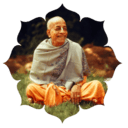Шри Чайтанья-чаритамрита Ади-лила 17.103
Оригинал:
আর দিনে জ্যোতিষ সর্বজ্ঞ এক আইল ।
তাহারে সম্মান করি’ প্রভু প্রশ্ন কৈল ॥ ১০৩ ॥
Транскрипция:
ара дине джйотиша сарва-джна эка аила
тахаре саммана кари' прабху прашна каила
Синонимы:
ара дине — в другой день; джйотиша — астролог; сарва-джна — всезнающий; эка — один; аила — пришел; тахаре — ему; саммана кари' — выразив почтение; прабху — Господь; прашна — вопрос; каила — задал.
Перевод:
В другой день к Господу пришел астролог, о котором говорили, что ему открыто все, что было в прошлом, что есть в настоящем и что случится в будущем.
Комментарий:
Брахманы обычно становились астрологами, аюрведическими лекарями, учителями и священнослужителями. Хотя они пользовались большим уважением в народе и были очень учеными, брахманы не стеснялись ходить от дома к дому, делясь с людьми своими знаниями. Например, брахман мог прийти к кому-нибудь домой, чтобы рассказать об обрядах, которые необходимо совершать в определенные дни (титхи), но, если в доме кто-то заболевал, к брахману шли за советом и помощью, и брахман назначал больному лекарство и давал свои рекомендации. А поскольку брахманы были сведущи в астрологии, люди часто обращались к ним с вопросами о своем прошлом, настоящем и будущем.
Хотя брахман пришел в дом Господа Чайтаньи просить милостыню, Господь принял его с большим почетом, поскольку тот был ученым брахманом, в совершенстве знавшим астрологию. Брахманы ходили по домам как нищие, но им оказывали уважение как почетным гостям. Так было заведено в индусском обществе пятьсот лет назад, во времена Чайтаньи Махапрабху. Этот обычай сохранялся еще сто лет назад и даже пятьдесят-шестьдесят лет назад, в пору моего детства, когда такие брахманы заходили к семейным людям с просьбой о подаянии, и люди получали по их милости большое благо. Самым большим благом было то, что семейные люди имели возможность сэкономить на услугах врачей, поскольку эти брахманы, помимо знания о прошлом, настоящем и будущем, могли давать врачебные советы и лекарства. Таким образом, все имели возможность получить помощь от первоклассного врача, астролога и священнослужителя в одном лице. Лидеры ИСККОН должны уделять большое внимание развитию нашей школы в Далласе, где детей обучают санскриту и английскому и готовят из них образцовых брахманов. Если их удастся воспитать настоящими брахманами, то они смогут спасти общество от преступников и мошенников; люди смогут жить счастливо под защитой квалифицированных брахманов. Поэтому в «Бхагавад-гите» (4.13) особое значение придается правильному устройству общества (чатур-варнйам майа сриштам гуна-карма-вибхагашах). К сожалению, в настоящее время многие называют себя брахманами только потому, что они происходят из семей брахманов, при полном отсутствии необходимых качеств. Поэтому сейчас все общество пребывает в хаотическом состоянии.

